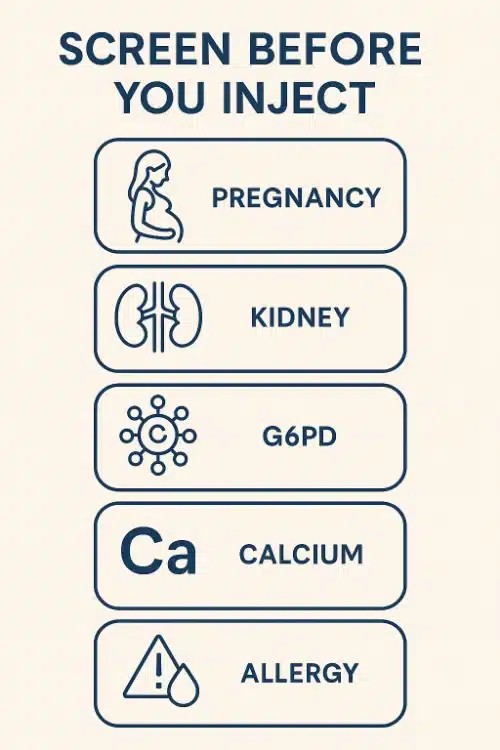Takeaways
-
Not everyone is a candidate for vitamin injections—screening for medical conditions prevents harmful outcomes.
-
Specific nutrients have well-defined contraindications tied to kidney function, allergies, and pregnancy risks.
-
Lab testing and ingredient awareness are essential before administering or receiving any injectable nutrient.
Why Screening for Vitamin Injections Matters
Many people assume vitamin injections are harmless because they are “natural,” but that assumption can be dangerous. Underlying health issues can make certain vitamins risky or even harmful when injected. Kidney disease, blood disorders, and pregnancy all require additional caution before any vitamin therapy begins. Screening is not about exclusion—it’s about delivering the right care to the right person at the right time. At Fountain of Youth SWFL, we evaluate every patient’s history and lab data before recommending injectable nutrients. That proactive care ensures safety without compromising effectiveness.

This graphic highlights five essential health factors that should be screened before administering any vitamin injection.
Pre-Injection Risk Assessment Protocols
Medical History Factors That Require Extra Caution
Patient history offers the first clues to whether vitamin injections are appropriate or potentially risky. Conditions like chronic kidney disease, liver dysfunction, or active cancer often alter how the body handles certain vitamins. Individuals with autoimmune issues or hematologic conditions may experience adverse effects from formulations containing preservatives or metals. Some medications, like metformin or proton pump inhibitors, can distort lab markers and complicate medication management. That’s why our intake includes both a full history and a conversation about recent medications and diagnoses.
Physical Exam & Lab Screening Essentials
Before starting vitamin injections, our team performs a basic physical screening and orders targeted labs. Blood pressure, hydration status, and visible inflammation may signal the need for added precautions. Functional tests like methylmalonic acid (MMA) and homocysteine help us identify vitamin B12 issues even when standard levels appear normal. Elevated calcium or low kidney filtration rates can flag contraindications for vitamin D or C, since impaired renal function may independently elevate MMA levels as shown in this NIH study. At Fountain of Youth SWFL, we use these insights to customize both dosing and nutrient choice.
Absolute and Relative Contraindications by Vitamin
Vitamin B₁₂ (Cyanocobalamin, Hydroxocobalamin)
B12 injections are generally safe, but specific health conditions demand careful screening. Individuals with cobalt allergies or Leber’s disease should avoid B12, as it may worsen their symptoms. Those with polycythemia vera or a history of blood clots may require lower doses or alternate forms. Injections containing benzyl alcohol should not be used in pregnancy due to risk of toxicity, a warning supported by this clinical review. We always review formulation ingredients to ensure they match each patient’s clinical needs.
Vitamin D (Ergocalciferol, Calcitriol)
Vitamin D injections can be life-changing, but not everyone qualifies for them. Patients with hypercalcemia, granulomatous diseases, or advanced kidney dysfunction may face increased risk of complications. In particular, active vitamin D analogs like calcitriol must be dosed precisely in renal patients. Too much can lead to dangerous calcium buildup, especially without monitoring. This reference confirms that calcitriol is contraindicated in patients with hypersensitivity, hypercalcemia, and renal impairment.
The table below highlights specific contraindications for different injectable nutrients. It clearly shows why careful screening matters before each injection.
| Nutrient | Contraindications | Screening Requirement |
|---|---|---|
| Vitamin B₁₂ | Cobalt allergy, Leber’s disease, benzyl alcohol in pregnancy | Check allergy history, pregnancy status, ingredient labels |
| Vitamin D (Calcitriol) | Hypercalcemia, renal failure, granulomatous disease | Measure serum calcium, eGFR, underlying diagnoses |
| Vitamin C | G6PD deficiency, renal impairment risk for oxalates | Screen G6PD status, eGFR before high-dose infusions |
| Iron | Hemochromatosis, active infection, allergy to iron complexes | Check ferritin, infection markers, allergy history |
Vitamin C (Ascorbic Acid)
While often marketed as an immune booster, vitamin C injections carry risks for some populations. High doses may cause oxalate buildup, leading to kidney stones or even acute kidney injury in sensitive individuals. Patients with G6PD deficiency face a higher risk of hemolysis and should not receive high-dose vitamin C. We always screen for kidney function and red cell enzyme status when patients seek antioxidant support. We only consider high-dose vitamin C options when renal function and enzyme status allow for safe infusion.
Iron, Folate, and Other Injectable Nutrients
Iron injections can correct major deficiencies, but they come with the risk of allergic reactions and overload. Patients with hemochromatosis or chronic infections must be monitored closely before starting iron therapy. Folate injections, though helpful, can mask an underlying B12 deficiency if used alone. Other B-complex nutrients, especially in high doses, may interfere with methylation or create imbalance when not monitored. Our providers take a full-scope view of all nutrient interactions before building a regimen.
Population-Specific Screening Guidelines
Pregnancy and Lactation
Pregnant or nursing patients require careful consideration due to both fetal safety and maternal needs. Preservatives like benzyl alcohol, commonly found in multi-use vials, pose toxicity risks to newborns. We assess the purpose, formulation, and trimester before recommending any vitamin injection during pregnancy. In some cases, we coordinate with OB/GYNs to ensure therapies align with prenatal goals. Our aim is to protect mother and baby while still addressing real nutritional deficiencies.
Pediatric Considerations
Children have different metabolic demands and tolerances, which shape how they respond to injections. Dosages must be adjusted for weight, and not all formulations are pediatric-approved. Children with underlying metabolic conditions or immature kidneys face higher risks from certain vitamins. We prioritize age-appropriate options and often consult pediatric providers when concerns arise. No injection happens without full parental understanding and documented clinical justification.
Geriatric Patients
Older adults often have multiple prescriptions, which can complicate vitamin absorption and metabolism. Declining kidney function and age-related changes in blood chemistry require adjustments in nutrient type and dosing. In some cases, apparent deficiencies may result from drug interactions, not actual lack of intake. We screen thoroughly to avoid unnecessary or risky interventions in this population. By aligning with each patient’s broader medical picture, we improve both safety and outcomes.

Certain symptoms should never be ignored after a vitamin injection, no matter how mild they seem.
Red Flags During or After Injection
Certain symptoms should never be ignored after a vitamin injection, no matter how mild they seem. Immediate signs like rash, shortness of breath, or chest tightness may indicate an allergic reaction. Delayed responses such as joint pain, skin discoloration, or swelling can signal localized or systemic inflammation. Our staff tracks every adverse event, no matter how small, and follows up with clinical review and documentation. This process builds a safety-first culture that patients trust. Our follow-up protocol ensures that no symptom goes unnoticed or untreated.
FAQ
Can I still get vitamin injections if I have kidney disease?
Possibly, but only after we review kidney function and relevant lab markers. Certain formulations must be avoided entirely.
Why do some injections list pregnancy as a warning?
Some preservatives and nutrients can cross the placenta or affect fetal development. We carefully evaluate risks before proceeding.
Are vitamin injections safe for people with autoimmune conditions?
Many are safe, but some ingredients may provoke inflammation. We individualize each plan based on medical history.
Do I need lab work before my first vitamin shot?
Yes, we rely on lab work to ensure injections are safe and correctly dosed for your needs.
3 Practical Tips
- Tip 1: Ask your provider if the injection contains any preservatives or additives that could affect your condition.
- Tip 2: Keep a symptom journal after each shot and report anything unusual right away to your care team.
- Tip 3: Share your full list of supplements and medications at every visit to prevent dangerous interactions.
Raising Awareness for Safer Vitamin Therapy
Not all patients benefit from a “more is better” approach when it comes to vitamin therapy. Understanding when not to inject is just as important as knowing when to proceed. At Fountain of Youth SWFL, our doctor-supervised injection protocols prioritize both safety and individualized care. We want patients to feel confident, informed, and empowered—not just treated. By sharing what many clinics overlook, we help raise the standard for responsible vitamin care.
Medical review: Reviewed by Dr. Keith Lafferty MD, Fort Myers on June 14, 2025. Fact-checked against government and academic sources; see in-text citations. This page follows our Medical Review & Sourcing Policy and undergoes updates at least every six months.




